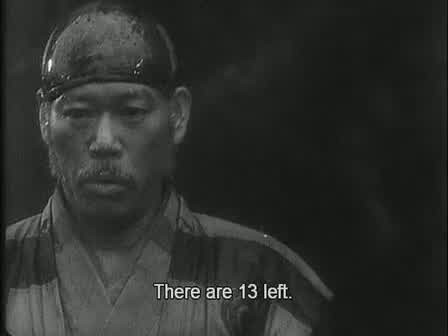Directed by:
黒澤明Cinematography:
Asakazu NakaiComposer:
Fumio HayasakaCast:
Takashi Shimura, Daisuke Katō, Minoru Chiaki, Isao Kimura, Seiji Miyaguchi, Toshirō Mifune, Kamatari Fujiwara, Atsushi Watanabe, Isao Yamagata, Reiko Mori (more)Plots(1)
With their village raided every year by vicious bandits, a group of peasants hire seven warriors to protect them. Initially met with suspicion, the warriors eventually gain the trust of the peasants and they join forces to face the bandits. Endlessly copied but never surpassed, Seven Samurai is a truly timeless classic. (British Film Institute (BFI))
(more)Videos (1)
Reviews (9)
The story does not differ from the more well-known American western classic, perhaps only in that Kurosawa gives more space to the villagers and the viewer can sympathize with them more, whereas in The Magnificent Seven, I was more concerned with how many cowboys would survive than with the farmers. I don't like looking for flaws in classics, but three hours for a story about saving a village from bandits is a bit too much, and especially in the middle third, I found myself glancing at the clock too often. This time, Asian grandiosity did not resonate with me.
()
The Japanese can be rightly proud of themselves, because already in 1954 they came up with such a breathtaking adventure spectacle, the likes of which had never been seen in Hollywood not only until then, but even a few years later. Much has already been said about The Magnificent Seven, which borrowed the theme and, according to many, even surpassed it, but I wouldn't go into any comparisons. Seven Samurai is, after all, a very different film, one that irradiates Japanese culture, and one that fleshes out the story in a far more detailed, emotional and realistic way than its American counterpart. The Samurai were no cowboys who would not bat an eyelash at a hostile attack, but a bunch of ordinary cheerful people with admirable endurance and courage. And maybe that’s the reason I liked the Japanese film a bit more, not only does it present the heroism and determination of the protagonists, but it also focuses on their character and their initially difficult coexistence with the oppressed population. 207 minutes may look exhausting, but believe me, there's probably no better way to spend them than watching Seven Magnificent Samurai under the guidance of Master Kurosawa...
()
Even though I'd been interested in Kikuchiya for a long time, even though it entertained me and made me laugh, it was too long... Yes, it's a legendary film that a lot of directors have taken their cue from. It's typically Japanese, those who don't know a bit of the Japanese mentality may be surprised by many things (the film remains misunderstood in many aspects); it flows slowly, it flows gradually, it flows with the seasons. And apparently it's a must for anyone who wants to get to know Kurasawa-sama a little :-) But let's not kid ourselves, the running time is just overlong... :-D
()
One of those movies that are not unnecessarily celebrated. It is a breathtaking opus that is indeed long, but not unnecessarily. There is drama, there is humor, action, and emotions. All of this in the story of a village that just wanted to help against the bandits. Great characters and great scenes that cannot be easily forgotten. Above all, the ending is truly harrowing and shows the form that gratitude can take towards people who died for you.
()
Seven Samurai is considered one of the cornerstones of the action and adventure genre. It is a film that is usually discussed in superlatives and is exceptionally highly rated by film fans. So please explain to me why I felt as if I had worked a full day in a quarry after watching it, even though I watched it with a break and only saw the edited 160-minute version. The original has an additional runtime of 43 minutes. Film critics generally consider Kurosawa's peak creative period to be in the 1950s, but I, on the other hand, believe that while Kurosawa's work in the 1950s was daring, ambitious, and clearly superior in quality to the gray Japanese contemporary production, he was still striving for directorial mastery. His samurai excursions into ancient history suffer from a theatrical acting style that often crosses over into unpleasant affectation. In this regard, Toshiro Mifune's portrayal of Kikuchiyo is sometimes unbearable. It is strange that this characteristic of Kurosawa's historical films is almost unnoticed by others. In comparison to the more famous American remake The Magnificent Seven, Akira ultimately achieved a draw in my eyes, even though both films have their strengths and weaknesses in different areas. The original film has a realistic tone, with the mercenaries not triumphing over a nearly sixfold numerical advantage due to exceptional fighting skills, but rather by joining forces with the village residents, training them in defense of their homes, and teaching them tactics and weapon control. In contrast, the American version is faster-paced and more entertaining, with a reasonable runtime and better-developed characters, but it is steeped in genre clichés and is a typical western fairy tale about invincible gunmen defeating villains. Overall impression: 60%.
()
Gallery (62)
Photo © Toho Company Ltd.



Ads